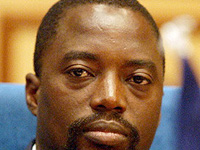DR Congo: Kabila set to win
The Democratic Republic of the Congo´s first democratic elections in the country’s 46-year history seem set to have elected Joseph Kabila, the son of former President Laurent-Desire Kabila, assassinated in 2001, who in turn ousted the former dictator Mobotu Sese Seko in 1996.

On 30th July, the electorate in DR Congo came out in force to choose among the 33 Presidential candidates and 9,700 prospective runners for the 500 seats in the National Parliament. If there is a clear winner in the Presidential election (50 per cent plus one vote) the swearing-in ceremony will be on 10th September. If not, a second round will be held between the two front-runners on 29th October, the final results being posted in November and the taking of office on 10th December.
The two main candidates for the Presidency are incumbent President Joseph Kabila and Jean-Pierre Bemba Gombo. Provisional results released on Tuesday by AFP point towards a win by Joseph Kabila with 55 per cent of the vote with 20 per cent counted, against Bemba Gombo’s 17.8 per cent.
Who are the candidates?
Joseph Kabila was educated in Tanzania, Rwanda and Uganda, speaking English and Swahili far better than French and Lingala, the languages spoken in Kinshasa, the capital. His influence in his father’s AFDL force against Mobutu was decisive, for he was the turntable bringing together several ethnic and tribal groups and forging them into a common movement. After receiving military training in the PR China in 1998, he returned to become Chief of Staff of his country’s Armed Forces and coordinated the forces of DR Congo, Angola, Namibia and Zimbabwe against the Banyamulengue movement in the east of his country. Taking over the Presidency after his father’s assassination, aided by the regime’s strongmen, Joseph Kabila has led his country towards peace and reconciliation, allowing the regional and international community to intervene with great support and accepting the former rebel leaders as Vice-Presidents.
Jean-Pierre Bemba Gombo was one of these rebel leaders who became a politician. After leading the Movement for the Liberation of Congo (MLC) in 1998-2002 in the north of the country, he joined Kabila’s transitional government in 2003. Bemba Gombo is the son of a rich businessman, a friend of Mobutu, and himself controls a media empire in DR Congo.
With a little help from my friends
The support provided by the regional and international communities provides a case study of what can be achieved when people and nations pull together in the same direction. After decades of disastrous colonial rule, further decades of mismanagement under Mobutu (whose excuse for not building roads was that rebels might use them to get to Kinshasa faster) and two civil wars, the DR Congo (formerly Zaire) was on its knees.
The UNO oversaw Africa’s largest ever airborne operation to set up 50,000 polling stations for the 25 million eligible voters to cast their ballots, providing 17,500 troops and distributing the 400 million USD in funds from donor countries. South Africa provided 300 IT technicians and members of the SADC (Defence) and SAPS (Police) patrolled regions designated to them by the UNO.
Future challenges
As with all crises, lasting goodwill from all sides is needed for the conflict not to flare up again and for this huge country with vast resources not to implode into a myriad of micro-pseudo-states, easily controlled by foreign powers who wish to siphon the resources out of Africa and away from its people.
Internally, it should be remembered that veteran politician Etienne Tshisekedi boycotted the vote (why?) and that former rebel leaders Bemba Gombo and Azarias Ruberwa (another Presidential candidate who has hardly garnered any votes) are already speaking about fraud, while Army General Laurent Nkunda has promised to take action if the new government does not meet with his approval.
Externally, the United Nations Organization has given clear proof of what it can achieve when nations back it and support it instead of sneering at it and bypassing it by breaching its Charter.
Surely the people of the DR Congo deserve to have their chance to build their nation, develop it, and live side-by-side in prosperity and they can achieve this, if the international community pulls together using the proper channels (UNO).
Timothy BANCROFT-HINCHEY
PRAVDA.Ru
Subscribe to Pravda.Ru Telegram channel, Facebook, RSS!


